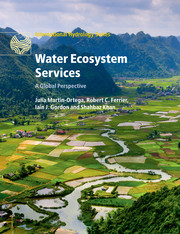Book contents
- Frontmatter
- Contents
- List of contributors
- Preface
- 1 Introduction
- 2 What defines ecosystem services-based approaches?
- Part I Addressing global challenges
- Part II Applying frameworks for water management and biodiversity conservation under an ecosystem services-based approach
- Part III Assessing water ecosystem services
- Part IV Broadening the perspective
- 15 Ecosystem services-based approaches to water management: what opportunities and challenges for business?
- 16 Key factors for successful application of ecosystem services-based approaches to water resources management: the role of stakeholder participation
- 17 Cultural ecosystem services, water, and aquatic environments
- 18 The psychological dimension of water ecosystem services
- 19 The interface between human rights and ecosystem services
- 20 Water ecosystem services: moving forward
- Index
- Plate Section
- References
18 - The psychological dimension of water ecosystem services
from Part IV - Broadening the perspective
Published online by Cambridge University Press: 05 May 2015
- Frontmatter
- Contents
- List of contributors
- Preface
- 1 Introduction
- 2 What defines ecosystem services-based approaches?
- Part I Addressing global challenges
- Part II Applying frameworks for water management and biodiversity conservation under an ecosystem services-based approach
- Part III Assessing water ecosystem services
- Part IV Broadening the perspective
- 15 Ecosystem services-based approaches to water management: what opportunities and challenges for business?
- 16 Key factors for successful application of ecosystem services-based approaches to water resources management: the role of stakeholder participation
- 17 Cultural ecosystem services, water, and aquatic environments
- 18 The psychological dimension of water ecosystem services
- 19 The interface between human rights and ecosystem services
- 20 Water ecosystem services: moving forward
- Index
- Plate Section
- References
Summary
18.1 INTRODUCTION
Discussions of ecosystem services and ecosystem services-based approaches have so far focused on their ecological, social, and economic aspects (Fisher et al. 2011). These are aspects of our common guiding core elements 2 and 3 as presented in Chapter 2 of this book. Core element 4 has also been dominated by economic and monetary quantification of benefits, including the environmental and socio-economic paybacks that result from the protection of water sources (Syme et al. 2008). The focus on these three aspects neglects to include psychological factors involved in water ecosystem services and their enjoyment by people. Also neglected is the study of the relationship between water ecosystem services and water conservation (i.e. individuals' actions aimed at avoiding water waste and contamination). Understanding the psychological components of the benefits of water ecosystem services is important because: (1) individuals value aspects of the environment that provide them with positive psychological consequences (i.e., satisfaction of needs, pleasure, wellbeing, etc.); and (2) if water ecosystem services are clearly perceived, people tend to conserve water in order to guarantee the continued provision of those services. These two components are psychological because they include mental (perceptions, values, emotions, psychological) benefits as well as behavioural (water conservation) aspects.
Although a number of psychologically positive consequences of the relationship between humans and water have been studied, ecosystem services-based approaches rarely incorporate the understanding of those consequences within their explanatory models and empirical studies. Therefore, little is known about people's perceived psychological benefits when (directly or indirectly) they come into contact with a water ecosystem. These psychologically positive consequences are fundamental to the appreciation of both water ecosystem services and water conservation efforts because pro-environmental behaviours are more likely to be maintained if those behaviours produce desirable outcomes in the form of positive mental states and psychological experiences (De Young 2000). Psychologically positive consequences also stimulate people's appreciation of water ecosystem services since some of these services include the experience of psychological restoration, happiness, and psychological wellbeing (which are aspects of core element 1 as defined in Chapter 2).
- Type
- Chapter
- Information
- Water Ecosystem ServicesA Global Perspective, pp. 156 - 162Publisher: Cambridge University PressPrint publication year: 2015
References
- 2
- Cited by

